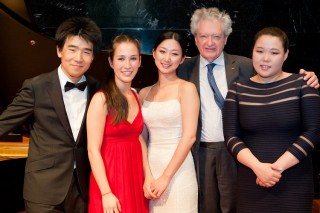Title
Subhead

From left: Jiayan Sun, Meta Weiss, Hae Ji Kim, Lewis Kaplan, and Saerom Kim after their Transatlantic Music Project concert at the Chamber Music Hall of the Beethoven House in Bonn.
(Photo by Susanne Horn)“Good things happen when you meet strangers.”
—Yo-Yo Ma (Pre-College ’71; Professional Studies ’72, cello)
Body
When I was asked by faculty member Lewis Kaplan (B.S. ’58, M.S. ’60, violin), to take part in the Transatlantic Music Project—a 10-day exchange program with Juilliard, the Hochschule für Musik und Tanz Köln, and Bowdoin International Music Festival—I was truly thrilled. In addition to four students from Cologne, the other three Juilliard participants were second-year master’s violinist Hae Ji Kim, Saerom Kim (Pre-College ’08; B.M. ’12, M.M. ’14, clarinet), and doctoral candidate Meta Weiss (M.M. ’11, cello).
From our first meeting, I was intrigued by the cultural diversity of the Cologne students and faculty. Musicians’ lives often traverse several cultures, and meeting one another can allow us to refine the cultural unity to be found in a composer’s work because we are able to see it from different perspectives. Fifty years ago there might have been talk about the Russian or French schools of playing; these days it’s increasingly difficult to justify these ambiguous and potentially misleading categorizations. Conscientious artists and ambitious students today strive to define and re-create the styles of individual composers in order to resonate in the hearts of listeners instead of blindly following certain performance practices or trends that may not reflect the artistic intentions of the composers. This liberated attitude toward music-making was apparent during our rehearsing and coaching sessions. Even though we came from diverse cultural and educational backgrounds, we shared the same goal and ideology in interpretation, and that enabled us to prepare two demanding programs within a limited timeframe. After insightful and inspiring discussions and tryouts, we collaboratively agreed upon interpretations we felt were true to the composers’ intentions and our aspirations to touch listeners’ hearts.
We started off in the gorgeous Tuscany hill town of Montepulciano, Italy, where we rehearsed and were coached by Kaplan and three Hochschule faculty members including Nina Tichman (B.S. ’71, piano), who helped organize the project along with Kaplan and Hochschule board member Claudia von Arnim. The 16th-century Palazzo Ricci offered a ravishing atmosphere in which to bring this project to fruition. The intense work was combined with beautiful walks, nice dinners, budding friendships and, in the case of some of my colleagues, stints as street musicians to advertise our concerts.
The next leg of our trip was spent in Germany, where we had coaching sessions and performed in Cologne. We also visited the Beethoven House in Bonn, which was one among the trip’s many high points. I was overwhelmed to see the tiny room where one of the most influential composers of all time was born. The museum exhibits many valuable items and graphics related to the great master’s life along with an extensive collection of manuscripts. Particularly meaningful to me was the room that housed Beethoven’s last piano. Built by Viennese builder Conrad Graf shortly before Beethoven’s death, the piano’s special feature was that most of the strings are quadruple-strung instead of the normal triple-strung to augment the resonance of the piano and help Beethoven hear it despite his near deafness. On the opposite side of the room, various monstrous-looking hearing aids that Beethoven used are on display. Through a headset, visitors can hear music reproduced to sound the way Beethoven might have heard it with his progressive hearing loss. Though I knew about all of this beforehand, I was deeply touched to see these items—reminders of the suffering, struggle, and ultimate accomplishment of the great master.
Later that day, we gave a successful concert at the Hochschule’s Chamber Music Hall, which was attended by the school’s rector and many of its students and teachers. The whole project culminated in a sold-out concert at the Chamber Music Hall of the Beethoven House, attended by distinguished guests including the U.S. consul general in Düsseldorf, Stephen Hubler, who later wrote to President Joseph W. Polisi that the project represented “cultural diplomacy at the finest.” It is a privilege for artists from different parts of the world to meet and exchange creative endeavors to preserve the cultural value of the great composers and share their messages across cultural divides.




